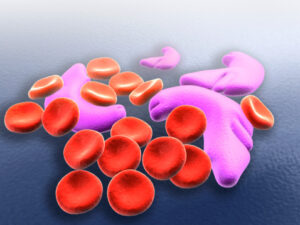Alloimmunization can lead to life-threatening hemolytic transfusion reactions and make it difficult to find compatible blood. While it is unknown why some transfused patients are more likely to develop alloantibodies against red blood cells, several studies suggest that CD4+ T lymphocytes (TLs) may play an important role. In order to investigate the role of TLs, researchers in France phenotyped fresh whole-blood TLs from 14 alloimmunized polytransfused adults (median 11.5 RBC units transfused) with sickle cell disease (SCD) and compared them to 9 non-alloimmunized polytransfused adults with SCD (median 241 RBC units transfused). Based on flow cytometry, a greater number of CXCR5+ PD1+ TLs were present in non-alloimmunized SCD patients compared to alloimmunized SCD patients (P<0.005) and healthy donors (P<0.0001). In addition, quiescent follicular T helper cells were not as prevalent among non-alloimmunized polytransfused SCD patients as compared to alloimmunized patients. Results suggest that understanding the cellular immune response may help to unravel the mechanism behind alloimmunization.
Reference:

